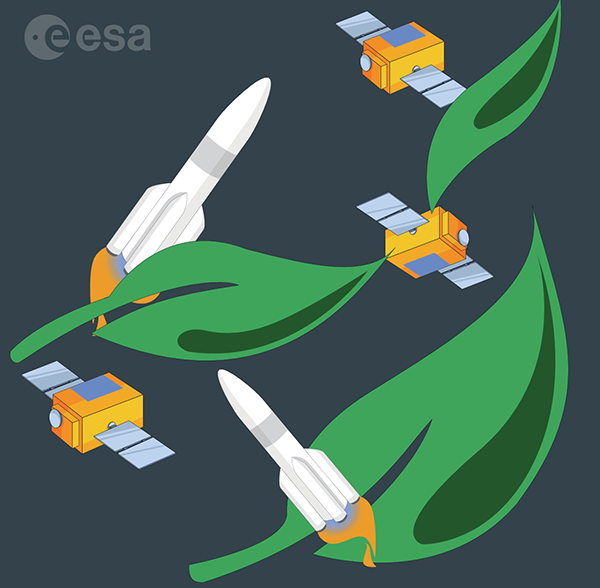
- This event has passed.
The conversation about the definition of "green" space systems and technologies will be held instead during the Clean Space Industry Days, that will take place at ESTEC from the 10th to the 14th of October.
Click HERE to register for the CSID22.
Clean Space webinar: Green for ESA

Environmental concerns are gaining increasing importance among public and private entities. European citizens have defined environmental topics as one of the main priorities to be tackled in the coming years. The signing of the European Green Deal has strengthened the push to become greener for all industries, including the space sector, while the ESA Green Agenda, has reiterated the importance of making ESA a greener organisation.
ESA is a pioneer in the field of Ecodesign, having actively worked on understanding and finding ways to decrease the environmental footprint of space missions, from their design to their disposal, for the past decade. This process started with the adaptation and application of the environmental Life Cycle Assessment (LCA) to space activities and progressed with the development and publication of the Space System Life Cycle Assessment Guidelines and the ESA LCA Database. The LCA allows the identification of environmental hotspots or areas of environmental improvement and the development of innovative solutions to decrease environmental impacts.
While other international and European guidelines for LCA exist, ESA’s guidelines are the first and only ones worldwide dedicated to space systems. In order to be consistent with other European LCA methodologies, ESA aims to align the Space System Life Cycle Assessment Guidelines with the European Commission’s Product Environmental Footprint (PEF) [1] method as much as possible, while ensuring that the specificities of the sector are well covered.
Applying Ecodesign to space missions means considering their environmental impact on Earth during the design process and fostering the use of green materials and manufacturing processes.
But what does “green” mean?
Currently, the word “green” is used with different meanings that can lead to different conclusions. Sometimes, it refers only to the reduction of CO2 emissions, others it refers only to environmental regulation compliance. But is this enough to call a product green?
ESA is working to define green systems and technologies. For this, it is believed that a methodology which allows for the quantitative assessment of the environmental improvement is necessary. This would avoid greenwashing of our space products and services and would ensure a harmonised understanding and use of the word green.
If you want to know more about the definition and discuss it with us, please join this webinar.
how to register
The Clean Space team would like to invite European Space stakeholders with an interest in sustainability applied to the space sector to join this webinar. The event is open to entities from ESA Member States, Cooperating States and Associate States.
Participants will receive confirmation and connection details prior the event.
If you have any question, feel free to email us: cleanspace@esa.int
Additional resources
- [1] PEF methodology final draft.pdf (europa.eu)
- [2] Single Market for Green Products – The Product Environmental Footprint Pilots – Environment – European Commission (europa.eu)
- Read more about the Ecodesign activities conducted by Clean Space here.
- Watch the “Ecodesign at ESA” webinar here.